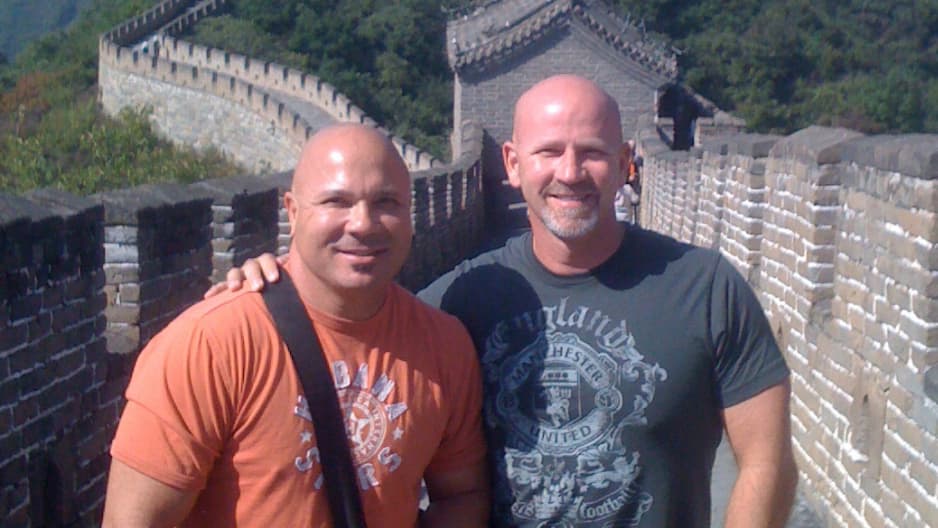Temple alum Dr. Douglas Mest and his husband Mark Pelekakis knew they wanted to pay their success forward to support Temple’s mission. Knowing their ‘why’, scholarship support became their ‘how’.
Douglas Mest, BS ’85, MD ’88, and his husband, Mark Pelekakis, acknowledge how lucky they’ve been. They’re also determined to help create that luck for the next generation of physicians—especially in a time when the path to medical education is more financially challenging and socially complex than ever. That’s why they’ve chosen to establish the Mest/Pelekakis Family Scholarship through a $1.25 M legacy gift to the Lewis Katz School of Medicine.
Doug and Mark met after his first year of medical school and have been together ever since—now into their fourth decade of shared life, growth, and commitment. Though Mark didn’t attend Temple, he has been there every step of the way through Doug’s medical training and career, supporting him through the long hours, the big milestones, and the moments that shaped the path forward.
“Being with Doug, I’ve seen firsthand the power of what an education can unlock,” Mr. Pelekakis said. “This scholarship is our way of helping someone else find that kind of path. We’ve had a good life—and now we get to share some of that good fortune with someone else who needs it.”
Building on a Legacy of Impact
Dr. Mest’s medical career reflects a drive to serve people in often-overlooked areas of care. Based in Los Angeles, he has built a nationally-recognized practice, and his expertise has led to appearances on multiple news and reality television programs, including a regular presence on the E! network show Botched, where he supports complex cases requiring advanced procedural skill.
From the very beginning of his career, the focus of Dr. Mest’s purpose and practice in medicine has centered on addressing real, unmet needs. In the late 1990s, he became one of the first U.S. physicians trained to administer an injectable treatment for HIV-associated facial lipoatrophy—a disfiguring side effect of early HIV medications that left many patients socially isolated and emotionally distressed.
At a time when stigma around HIV still limited access to care, Dr. Mest was part of a clinical trial that helped bring that treatment—later known as Sculptra®—to FDA approval. “Patients would tell me, ‘I finally feel like I can go home and see my family again,’” he recalled. “That kind of impact stays with you. You realize that medicine is about more than outcomes. It’s about dignity.”
Through the decades, Dr. Mest has continued to work on the cutting edge of aesthetic medicine while also training the next generation of physicians in the field. And through it all, he has remained grateful for the foundation he received at Katz.
“Temple gave me the knowledge and flexibility to grow into new parts of medicine that didn’t even exist when I graduated,” he said. “It prepared me to think broadly, and to lead with purpose.”
That purpose, for both Doug and Mark, is what ultimately led them to create this scholarship. They see it as a way to give back, and as a statement of belief in what Katz stands for.
“We’ve been thinking about this gift for years,” said Dr. Mest. “And part of the reason we chose now was because Temple hasn’t wavered. In a time when a lot of institutions are stepping back from their mission, Katz continues to stand for inclusion, access and opportunity.”
Their decision resonated with Amy J. Goldberg, MD, FACS, the Marjorie Joy Katz Dean of the Lewis Katz School of Medicine, who emphasized that the power of their gift goes far beyond its financial impact.
“This kind of generosity is so meaningful because of the support it provides and what it stands for,” she said. “Doug and Mark’s gift is a powerful affirmation of our mission. It shows our students—current and future—that there are people who believe in their passion and potential, and who believe in the kind of medicine we teach at Katz.”
A Gift That Took Shape Over Time
Doug and Mark had long discussed the idea of giving back to Temple but weren’t initially sure how to make it happen. “We had the concept of doing it for years,” Dr. Mest said. “But I kept getting stuck on the details—how much, when, how it would work.” It wasn’t until they sat down with Temple staff that things began to fall into place.
They learned that giving doesn’t have to be rigid or overwhelming—and that Temple could help them structure a legacy gift that aligned with their values and long-term plans. “That was really freeing,” he continued. “We realized we didn’t need to have every detail figured out to start making a real commitment.”
That flexibility was key in moving from intention to action. “It made the whole process feel like something we could do together, in a way that made sense for our life,” said Mr. Pelekakis.
Their experience is a reminder that there are many ways to support the next generation of physicians—and that Temple can help donors explore options that reflect their priorities, intentions, and plans for the future.
Doug and Mark hope their gift allows future physicians to stay focused on what matters most.
“The hope is that students who graduate with less debt can afford to follow their purpose,” shared Mr. Pelekakis. “They can go into primary care, work in underserved communities—do the things that drew them to medicine in the first place.”
They know how transformative a single opportunity can be—and now, they’re making sure others have one.
“We hope this scholarship gives someone the confidence to keep going, to believe in themselves,” said Dr. Mest. “Hopefully they’ll walk through that open door—and go on to change the world.”

